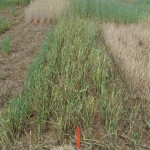I know this has been a frustrating planting season to say the least. Replanting has been more the rule than the exception this spring. There have been reports of fields that were first planted to corn then replanted to cotton and now will likely be replanted to soybean. With all the troubles planting and replanting this spring please do not forget to manage Palmer amaranth or you may have to replant yet again just to control the pigweed. These June weather conditions are shaping up to be a perfect Palmer amaranth storm! Continue reading
Category Archives: Weeds
Managing Corn, Cotton and Soybean Replant
We had quite a bit of cotton planted, some late corn planted and a start to soybean planting the week of May 13th that was abruptly cut short by 3 plus inches of rain and yet another cold spell on May 20. This caused quite a bit of replanting in all three crops this week particularly in cotton and soybean. The question arises about the best way to remove the partial sickly stand before the new planting emerges. Continue reading
Fierce and Zidua Management Tips in Soybeans
Palmer amaranth has come late to the party compared to last year but is making up for it by taking off in a lot of fields. If you remember, last year it started emerging in early March. This was a big advantage as we had a lot of time to control multiple Palmer flushes prior to planting. This allowed growers to really whittle down the numbers of Palmer before we even thought about planting the crop. That will not be the case this year. Continue reading
UT Weed Tour June 20
Dear Colleagues
The University of Tennessee Weed Tour will be held Thursday, June 20 at the West Tennessee Research & Education Center in Jackson, TN. Registration will start at 8:30 A.M. and the tour will begin at 9:00 A.M.. Continue reading
Cover Crop Burndown Applications

Some reports of ineffective burndown applications to winter annual cover crops (winter wheat, cereal rye, hairy vetch, crimson clover, etc.) have been coming in. Even in our research at the West Tennessee Research and Education Center cover crops have proven difficult to control with a single pass of the sprayer. Paraquat and glyphosate are the typical go-to herbicides for this type of burndown application, but neither has proven consistently effective this spring. Continue reading
How much herbicide is left in the April planted corn?
Judging by rating corn trials this week the answer depends upon the herbicide. Continue reading
Metribuzin Tolerance Testing in Soybean
Many producers in Tennessee are utilizing metribuzin (Sencor/Lexone/Tricor/etc) pre emergence in their soybeans to help control Palmer amaranth. Continue reading
Palmer Amaranth Burndown Strategies
Palmer amaranth started emerging last week. Some of it is ½ to a 1” tall today April 22. Of course this is just the vanguard of the Palmer that will be coming. Despite this early Palmer flush typically being less numbers per foot than later emergence events, it is the most important emergence event to control. Continue reading

